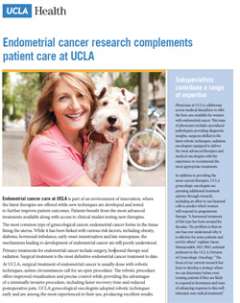Uterine / Endometrial Cancer
Find Your Care
Whether you need a preventative examination, pregnancy care or treatment for a gynecological condition, our OB/GYN specialists are here for you.
Call 310-794-7274 to schedule an appointment today.
Uterine / Endometrial Cancer: Symptoms, Risk Factors, Treatment
Gynecologic & Cancers | Gynecology | Clinical Trials
What is endometrial cancer?
What are the symptoms of uterine / endometrial cancer?
- Irregular periods
- Postmenopausal bleeding
- Abnormal vaginal discharge
- Changes to bowel or bladder habits (i.e., urinary frequency)

What are the risk factors for uterine / endometrial cancer?
- Getting older
- Taking Estrogen without Progestin
- Young age of first period or late menopause (after age 55)
- Obesity
- Diabetes mellitus
- Inherited risk due to gene mutation (Lynch Syndrome)
- Tamoxifen therapy
- Polycystic ovarian syndrome (chronic anovulation)
- Infertility
What are the preventative measures against uterine / endometrial cancer?
- Use of birth controil pills or progestin IUD
- Being physically active and staying at a healthy weight
- If using estrogen, add progesterone to protect the lining of the uterus
- Removal of the uterus (hysterectomy)
What should be discussed with my OBGYN?
- Any abdormal vaginal bleeding, including bleeding with sex, bleeding between periods
- Pelvic pain
- The role of endometrial biopsy
- If postmenopausal, discuss the risks of taking hormone replacement therapy
- If you have a family history of cancer, ask if genetic testing for hereditary uterine cancer is needed.
- The reasons for hysterectomy
What are the treatment options for uterine / endometrial cancer?
Women who have been diagnosed with or who have suspected endometrial / uterine cancer should be referred to a gynecologic oncologist for further evaluation to determine the optimal treatment option.
Uterine / endometrial cancer is most commonly treated with surgery, but some women will also need radiation therapy and/or chemptherapy. Our UCLA doctors are dedicated to providing patients with individualized care. So, depending on your age, the stage, size and location of your cancer, our expert team may use a combination of treatments in caring for you and your cancer.
Cancer Support Resources
The UCLA Simms Mann Center for Integrative Oncology is our cancer support center. Our Simms Mann Center provides free mental health resources for cancer survivors. If you are having trouble finding help, please let your cancer team know so we can assist you in finding you the care you need. For more information visit the UCLA Simms Mann Center for Integrative Oncology.
UCLA’s Division of Gynecologic Oncology offers a comprehensive and growing survivorship program for our patients. We also have available our Uterine Cancer Survivorship Pamphlet (PDF) as a resource for you and your family.